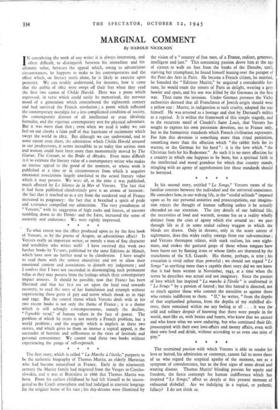MARGINAL COMMENT
By HAROLD NICOLSON
IN considering the work of any write: it is always interesting, and often difficult, to distinguish between his immediate and his ultimate value, between the appeal which, owing to adventitious circumstances, he happens to make to his contemporaries and the effect which, on literary merit alone, he is likely to exercise upon posterity. We can readily understand, for instance, how it came that the public of 1812 were swept off their feet when they read the first two cantos of Childe Harold. Here was a poem which expressed, in verse which could easily be memorised, the nervous mood of a generation which remembered the eighteenth century and had survived the French revolution ; a poem which reflected the contemporary nostalgia for a less complicated condition of society, the contemporary distrust of all intellectual or even idealistic formulas, and the vigorous contemporary zest for physical adventure. But it was more than that ; even when we read it today we can feel on our cheeks a faint puff of that hurricane of excitement which swept the world in 1812. But although we can understand, and to some extent even share, the admiration which Childe Harold aroused in our predecessors, it seems incredible to us today that serious men and women could have been more than momentarily moved by The Giaour, The Corsair, or the Bride of Abydos. Even more difficult is it to estimate the literary value of a contemporary writer who makes an intense appeal to the mood of the moment, or whose work is published at a time or in circumstances from which it acquires emotional associations largely unrelated to the actual literary value which it may possess. We were all, at the time it was published, much affected by Le Silence de la Mer of Vercors. The fact that it had been published clandestinely gave it an aroma of heroism: the fact that it reached us as a cry from the sundered soul of France increased its poignancy : the fact that it breathed a spirit of pride and resistance compelled our admiration. The very pseudonym of " Vercors," with its suggestion of high rocks and forests, of torrents tumbling down to the Drome and the Isere, increased the sense of austerity and endurance. We were rightly impressed.


























 Previous page
Previous page